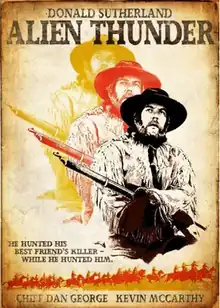Alien Thunder
Alien Thunder (also known as Dan Candy's Law) is a 1974 Canadian Northern film directed by Claude Fournier and starring Donald Sutherland. Its original screenplay was written by W.O. Mitchell but Mitchell removed his name from the final release due to changes that were made.[1]
| Alien Thunder | |
|---|---|
 Video cover | |
| Directed by | Claude Fournier |
| Written by | George Malko |
| Produced by | Marie-José Raymond |
| Starring | Donald Sutherland Gordon Tootoosis Chief Dan George Kevin McCarthy Jean Duceppe |
| Cinematography | Claude Fournier |
| Edited by | Yves Langlois |
| Music by | Georges Delerue |
Production company | Onyx Films |
| Distributed by | Ambassador Film Distributors (Canada) American International Pictures (USA release) Cinerama Releasing Corporation |
Release date | 22 February 1974 |
Running time | 93 minutes |
| Country | Canada |
| Language | English |
| Budget | $1,500,000 |
Synopsis
Set in 1890s Saskatchewan after the North-West Rebellion, Alien Thunder is based on a true story about a Woods Cree (Gordon Tootoosis in his first film role) who kills a North-West Mounted Police sergeant (Kevin McCarthy) under desperate circumstances. Hunted for two years by the sergeant's resolute partner (Donald Sutherland), the ending brings tragedy for all those involved.
Cast
- Donald Sutherland as Sgt. Dan Candy
- Gordon Tootoosis as Almighty Voice
- Chief Dan George as Sounding Sky
- Kevin McCarthy as Sgt. Malcolm Grant
- Jean Duceppe as Inspector Brisebois
- Francine Racette as Emilie Grant
- Jack Creley as Arthur Ballentyne – Indian Agent
- James O'Shea as Edouard
- John Boylan as Cpl. Harold Bellringer
- Lenny George as Rolling Grass
- Ernestine Gamble as Small Face
- Vincent Daniels as Many Birds
- Sarain Stump as Napoleon Royal
Production
Alien Thunder was filmed in Saskatchewan's Battleford, Duck Lake, and Saskatoon.
The RCMP, which had originally seen the film as a centrepiece of its 1973 centennial celebrations, withdrew its backing. Donald Sutherland called Mr. Fournier’s direction of the project “wretched".[2]
Release
The film was not a financial success.[3] "Suspense is lacking and characters are generally underdeveloped, as is the tension between the Mounties and the Indians.", stated Natalie Edwards for Cinema Canada.
An article in Luma found that "Though it laudably uses Indigenous (and principally Cree) actors and some of the Cree language, Alien Thunder is ultimately a film about Mounties and settlers; as sympathetic as it may be to the Cree, they are, as the native peoples of the Americas tend to be in Westerns, reduced to supporting players in their own story. "[4]
References
- Conway, Alana. ""Blood on the Poplars: ALIEN THUNDER (1974) and the Story of Almighty Voice"". Luna Quarterly. Retrieved 7 December 2019.
- "Quebec filmmaker Claude Fournier adapted Gabrielle Roy's the Tin Flute". The Globe and Mail. 26 March 2023.
- Lerner, Loren R. (January 1997). Canadian Film and Video: A Bibliography and Guide to the Literature. University of Toronto Press. ISBN 9780802029881.
- "Blood on the Poplars: ALIEN THUNDER (1974) and the Story of Almighty Voice". Luma Quarterly. Retrieved 17 June 2023.
External links
- Alien Thunder at IMDb
- Alien Thunder is available for free viewing and download at the Internet Archive